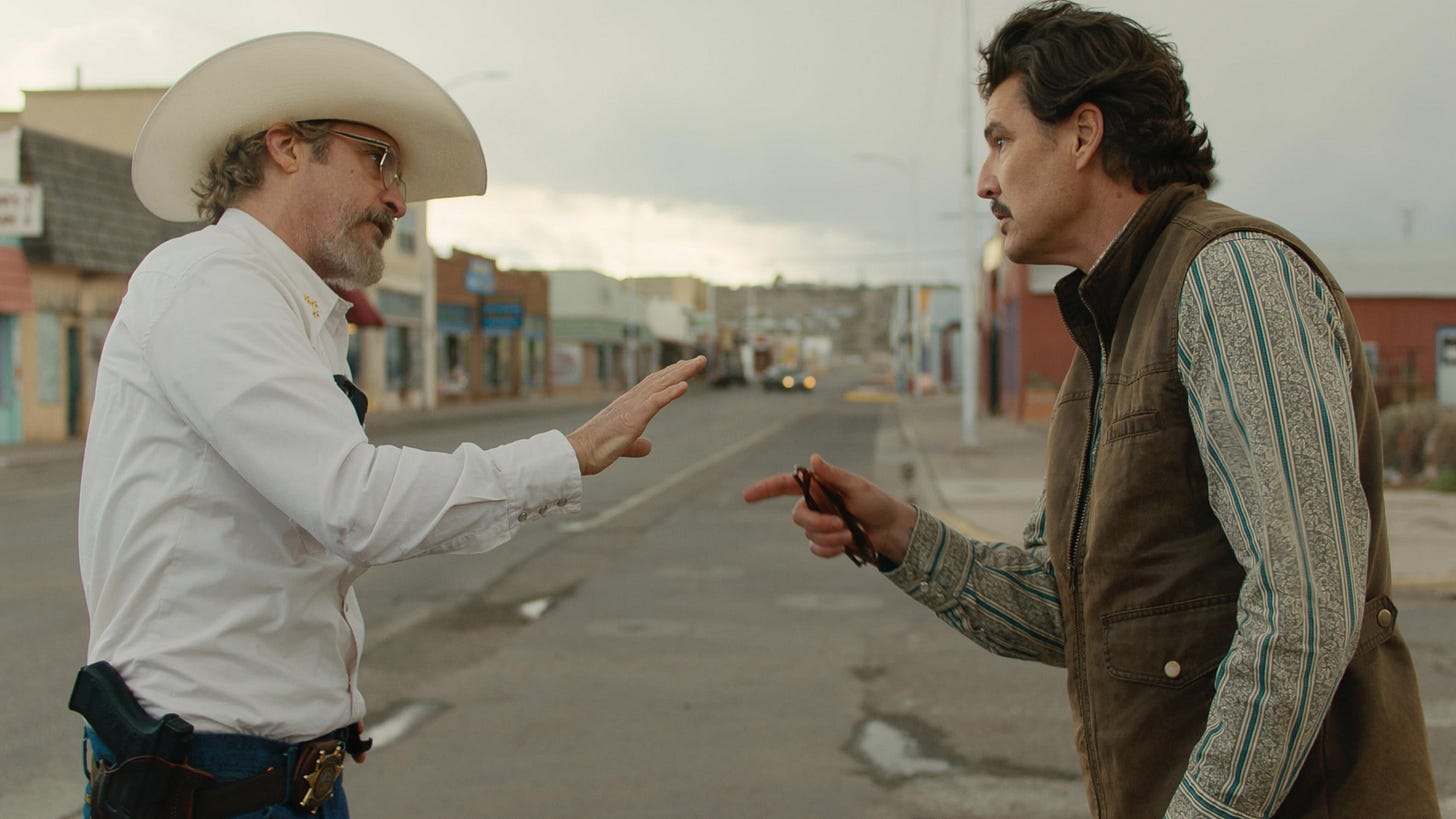Auto-fiction as politics
Eddington is a dark prophecy of information overload and epistemic collapse
Ari Aster’s Eddington, though a distinctly unsettling viewing experience, is an extremely prescient film. If you go in blind like I did, you may find it vaguely right-coded for the first hour or so given all the ribs at pandemic health measures, woke performativity, and so on.
In Joaquin Phoenix’s Joe Cross, a local sheriff who dislikes masking and has no time for incumbent mayor Ted Garcia (Pedro Pascal) and his rather performative allegiance to masking and social distancing, we seem to have an archetypal conservative hero. The film being set in 2020, there is also a flock of radlib youngsters who call everything white supremacy and have taken to holding Black Lives Matter rallies in the small New Mexico town of Eddington despite the apparent absence of any black residents (aside from one sheriff deputy). When Phoenix’s character goes viral with a Facebook post denouncing Garcia for his Big Tech-friendly pursuit of a new “data center” in town and announces his own candidacy, we potentially have the makings of something fairly predictable.
The thing is, Eddington isn’t that kind of film at all. As its story proceeds, its right-coded characters become just as unsympathetic and hypocritical (if not more so) and it subsequently lurches through a series of tonal shifts so abrasive they can almost make you forget the relatively light comedy of its first hour. But Aster’s film is not a liberal satire of lockdown era conservatism either, nor the kind of lazy equal opportunity offender flick seeking to poke fun at “both sides.”
Its innovation, instead, is to show us what it really looks (and feels) like when consensus reality disintegrates before our very eyes. Not incidentally, its characters are all extremely online, and Aster quite intentionally makes a point of allowing us to see the world as they do: i.e. through cable news and the apps and platforms on their iPhone screens. These are people, eerily real, whose primary points of identification with social reality are network television and the little slot machine they carry around in their pocket. That Eddington is a small town where most of the locals know each other and nothing much really seems to happen only magnifies the effect.
Elsewhere, major events unfold and everyone metabolizes them through digital media. Because this is 2020 and everything is so anxious and confused, the characters desperately do their utmost to make the world legible — though, inevitably, these efforts are refracted through the prism of their own subjectivity. The result is that many build up grand, mind palace narratives — as heroic as they are incoherent — to explain what’s happening and to rationalize their own behaviour.
Austen Butler, for example, shows up as a kind of grifting, QAnon adjacent cult leader who spins out an elaborate (and obviously fabricated) backstory about escaping from the clutches of a child sex trafficking ring. Brian (Cameron Mann) awkwardly flirts with social justice influencer Sarah Allen (Amélie Hoeferle) after reading a few sentences about Angela Davis on Wikipedia and, before too long, can be heard earnestly talking up critical race theory and police abolition (later, having been rejected by Sarah, he duly gets into alt lite trad posting with much the same ease). Pheonix’s Sheriff Cross, perhaps predictably, campaigns against the incumbent mayor’s new data center by linking it to George Soros and Bill Gates (while, it seems, personally investing in the definitely not Big Tech-related Bitcoin). By film’s end, he has gone full Kyle Rittenhouse and is fighting a one-man last stand against what appears to be a sinister army of antifa supersoldiers who have descended on the town.
The thing is — like the characters themselves — we actually have no idea what’s going on here or which events are “real.” But, since Eddington’s narrative is so convoluted and labyrinthine, it’s incredibly tempting to try and figure out. And if you did try, I imagine it would be possible to weave together all kinds of elaborate theories, some of which might even sound fairly compelling.
In effect, Eddington intentionally disrupts the viewer’s sense of reality then, having burdened them with epistemic doubt, invites the very kind of radically individualized reading its own characters are all so compulsively doing through their screens and devices.
Info wars
What ultimately makes Eddington so unsettling is the extent to which we’re all now living in its reality. Some people are quite literally being driven crazy by the news —and, more specifically, by the particular way it’s come to be metabolized through digital media.
Our world is a troubling and confusing place, and thanks to unprecedented interconnectivity we can collectively bear witness to shocking, horrific, or gruesome events in realtime. Mainstream narratives about these events — whether those of elected officials or traditional media outlets — often leave much to be desired and it’s perfectly natural, in turn, to seek out alternative ones that seem to make more sense. When this kind of dissonance collides with social atomization, economic uncertainty, and the generalized feeling of political powerlessness, the result is a noxious cocktail that erodes the foundations of consensus reality.
This is where the standard explanation blaming “fake news” and “misinformation” for falls short.



